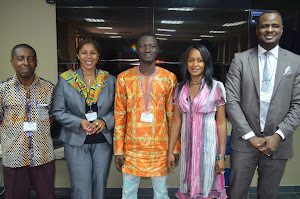By
Edmund Smith-Asante, NAIROBI
President Uhuru Kenyatta opened the 18th AfWA Congress
Kenyan President, Uhuru Kenyatta, has called for the
highest level of commitment from African governments in the management of the
continent’s water resources.
This he said, would not only ensure the effective management
of the water resources but also lower the potential for conflicts as a result
of water scarcity.
Opening the 18th International Congress
and Exhibition of the Africa Water Association (AfWA) in Nairobi last week
Monday, President Kenyatta said “there is great need that we must work harder,
if we are to achieve the sustainable clean access to water that our people
rightly deserve,” adding, “In fact, we shall need the highest level of
commitment to push ahead a continental and eventually the global agenda for
change in the management of our water resources.”
He stated that this was not something that needed
contemplation, “for indeed as population rises and livelihoods are threatened
by the unsustainable consumption of water resources, productivity decreases and
the potential for conflict over the scarce resource also increases. This may be
particularly important in the horn of Africa where water security has real
economic, social, ecological as well as political value.”
The theme of the congress was “Sustainable access to
water and sanitation in Africa”.
Global
water situation
President Kenyatta cited the UN Water report of 2014,
which projected that global water would dry up by some 55 per cent by 2050,
which meant that freshwater availability would be increasingly strained, with more
than 40 per cent of the world’s population living in areas of severe water
stress by 2050.
However, while cautioning that Africa would be among
those severely affected by the water stress, he indicated that all was not
gloom, saying the WHO and UNICEF Joint Monitoring Programme in its final report
detailed significant progress on access to drinking water and sanitation at the
end of the Millennium Development Goals in 2015.
“The goal indicates that 91 per cent of the global
population used improved drinking water resources and services up from 1990.
This means that approximately 6.6 billion people in the world have access to
improved sources of drinking water. Those without access stand around 663
million, the very first time the number has fallen below 700 million,” he
stated.
He said water was a right and that every Kenyan should
have access by 2030 according to the country’s blue print, pledging that Kenya
will work closely with international water organisations to attain the Sustainable
Development Goals (SDGs).
“This is why we felt strongly supporting the 3rd
International Water Association (IWA) development congress in 2013 as well as
our election to the World Water Council in 2015 and now the hosting of the 18th
AfWA International Water Congress and Exhibition,” he noted.
President Kenyatta told the delegates that to make
the theme a reality, the congress ought to come up with practical solutions to
the challenges Africa faced in providing its sons and daughters with water that
they needed.
These, he said, included sustainable water resource
management, the governance of water utilities, the promotion of information
technology, and reduction of non-revenue water, together with reliable water
distribution, prudent infrastructure development and adaptation of best
practices and operation and maintenance must be thought about.
Consequence
of lack of access
In his welcome address, the outgoing President of AfWA, Professor Hamanth Kassan, said “one of the consequences of a lack of access is the startling statistic, which we should all be conscious of; that is every 12 seconds one child dies of water-borne disease.”
In his welcome address, the outgoing President of AfWA, Professor Hamanth Kassan, said “one of the consequences of a lack of access is the startling statistic, which we should all be conscious of; that is every 12 seconds one child dies of water-borne disease.”
He stated that most of the innocent children were
from Africa and were below the age of five, adding that human kind, including
water professionals, therefore, had an obligation to rise to the challenge
facing the African continent, by seeking, finding and creating innovative
solutions, in order to improve the lives of the African people.
It was for that reason, he said, that the sessions
of the conference had been designed to focus on innovations, capacity building,
governance and performance. “We should all be reminded that history will judge
us not on the basis of what we said, but rather, on the basis of what we
delivered,” he said.
Professor Hamanth Kassan
Water
and poverty
The Cabinet Secretary of Water and Irrigation, Mr
Eugene Wamalwa, said in an education and poverty survey conducted in Kenya in
2009, 46 per cent of the respondents indicated that the provision of water was
the most crucial aspect to get them out of poverty.
He therefore, called for a review of policies, an
analysis of implications and the necessary actions for interventions under
water, food and energy.
He said the Ministry of Water in Kenya was about to
undertake groundwater mapping in three phases in conjunction with county
governments, corporations, development partners and academia, to identify areas
of high groundwater potential, in order to enhance the effectiveness of
managing the resources for development.
“In Kenya we increased our annual budget allocation
from $5 million to $450 million in a period of less than 10 years, yet this is
not enough as still more than 20 million Kenyans do not have access to safe
drinking water, while more than 10 million do not have access to better
sanitation,” Mr Wamalwa said.
Writer’s email: edmund.asante@graphic.com.gh
FACT
SHEET
The AfWA was established 36 years ago and continues
to make strides in ensuring that utilities from the member states engage and
partner with each other with the aim to improve service delivery.
NUMBER
CRUNCH
More than 1,500 delegates from 81 countries
including water professionals and allied service providers are attending the 18th
AfWA Congress and Exhibition.







No comments:
Post a Comment